Netflix Losing Streaming Dominance to Disney Plus, HBO Max, Apple TV Plus
Netflix has lost a giant slice of its mindshare to competitors in recent years, leading to big changes — and opportunities — for subscribers.

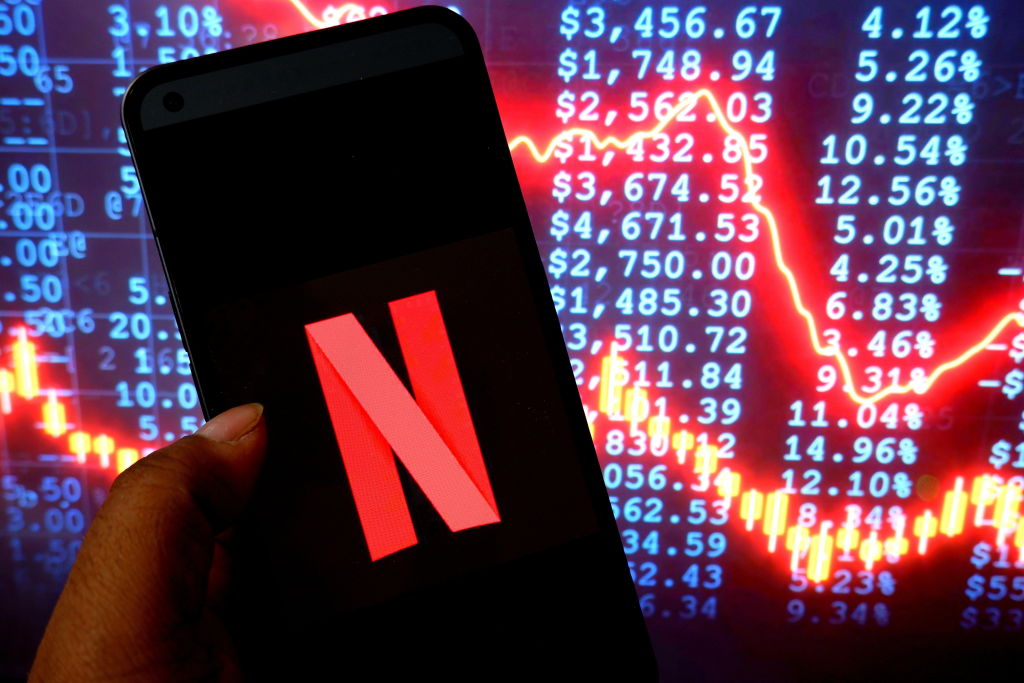
Profit and prosper with the best of Kiplinger's advice on investing, taxes, retirement, personal finance and much more. Delivered daily. Enter your email in the box and click Sign Me Up.
You are now subscribed
Your newsletter sign-up was successful
Want to add more newsletters?

Delivered daily
Kiplinger Today
Profit and prosper with the best of Kiplinger's advice on investing, taxes, retirement, personal finance and much more delivered daily. Smart money moves start here.

Sent five days a week
Kiplinger A Step Ahead
Get practical help to make better financial decisions in your everyday life, from spending to savings on top deals.

Delivered daily
Kiplinger Closing Bell
Get today's biggest financial and investing headlines delivered to your inbox every day the U.S. stock market is open.

Sent twice a week
Kiplinger Adviser Intel
Financial pros across the country share best practices and fresh tactics to preserve and grow your wealth.

Delivered weekly
Kiplinger Tax Tips
Trim your federal and state tax bills with practical tax-planning and tax-cutting strategies.

Sent twice a week
Kiplinger Retirement Tips
Your twice-a-week guide to planning and enjoying a financially secure and richly rewarding retirement

Sent bimonthly.
Kiplinger Adviser Angle
Insights for advisers, wealth managers and other financial professionals.

Sent twice a week
Kiplinger Investing Weekly
Your twice-a-week roundup of promising stocks, funds, companies and industries you should consider, ones you should avoid, and why.

Sent weekly for six weeks
Kiplinger Invest for Retirement
Your step-by-step six-part series on how to invest for retirement, from devising a successful strategy to exactly which investments to choose.
Netflix is feeling the heat. Since 2020, the global streaming giant has slowly returned to the pack, after previously dominating the market throughout the 2010s. Despite viral hits like Stranger Things and Wednesday, Netflix continues to cede ground in the streaming wars to rivals including Disney Plus, HBO Max, and Apple TV Plus. We've got more on Netflix’s steady market share decline and what that means for streaming customers.
Netflix market share falls back to earth
Based on data from the streaming guide JustWatch.com, Netflix has lost 13% of its streaming video-on-demand (VOD) market share to competitors since January 2020. The following chart demonstrates steadily declining interest in Netflix programming among 30 million JustWatch users in 120+ countries, over the past three years. As search volume for Netflix content wanes, interest is increasing steadily in Disney Plus, HBO Max, and Apple TV Plus.
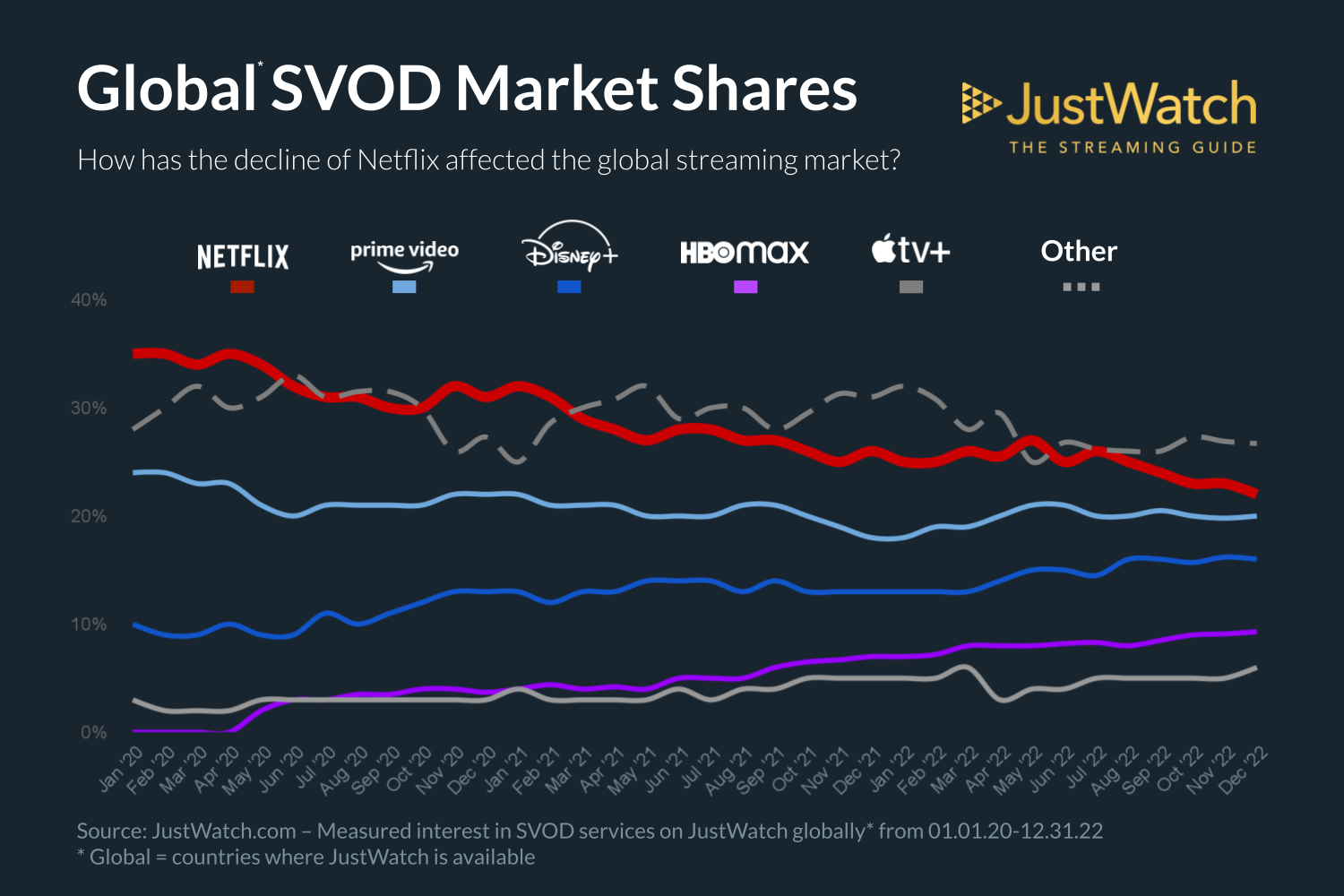
Netflix’s market share among JustWatch users has declined from roughly 46% to 33% since January 2020. Disney Plus has risen from 10% to roughly 18%. After its May 2020 launch, HBO Max has increased from 0% to nearly 10% market share. Apple TV Plus has increased from 4% to 6%. Meanwhile, Amazon Prime Video and “other” services like Hulu and Peacock have either stayed flat or declined slightly in market share.
From just $107.88 $24.99 for Kiplinger Personal Finance
Become a smarter, better informed investor. Subscribe from just $107.88 $24.99, plus get up to 4 Special Issues

Sign up for Kiplinger’s Free Newsletters
Profit and prosper with the best of expert advice on investing, taxes, retirement, personal finance and more - straight to your e-mail.
Profit and prosper with the best of expert advice - straight to your e-mail.
To cut costs in the face of mounting challenges, Netflix launched two rounds of layoffs in 2022, firing a total of 450 employees across the United States. According to Variety, these cuts amounted to roughly 4% of its roughly 11,000 global employees. Despite that, Netflix maintained an aggressive $17 billion budget for new content in 2022, matching its 2021 content spending.
Netflix subscription deals
ABC News reports that Netflix lost nearly 1.2 million subscribers during the first half of 2022. This dramatic loss drove the company to introduce an ad-supported subscription plan that costs $7 per month in the U.S. The new price point is less than half the price of its most popular plan. This ad-supported option has proved extremely popular at a time of high cost of living, helping Netflix add 10 million subscribers in the second half of 2022.
Netflix also recently cut subscription prices in 30 of its smaller markets to lure customers back. These Middle Eastern, Eastern European, and Sub-Saharan African countries represent a small part of Netflix’s overall business, but product and pricing tests in smaller markets often make their way to larger markets like the U.S. later.
Competitor streaming deals
- HBO Max jumped into the price cuts game in 2022 by offering a 40% discount for a year's subscription to new and returning customers. The deals came after parent company Warner Bros. Discovery announced they would merge HBO Max and Discovery Plus into one combined streaming service by mid-2023. Although they may be back-tracking on that plan now...
- Disney Plus followed Netflix with its own ad-supported packages at $7.99 a month in December 2022. Disney launched major changes — including bringing back legendary former CEO Bob Iger — in a bid to boost revenue in the face of Disney Plus’ profitability problem.
- Apple TV Plus has sought to undercut Netflix and others with high-gloss content at a surprisingly low price. A monthly subscription with no ads currently sits at $6.99, making it the cheapest ad-free streaming experience. Apple offers various promotions for Apple TV Plus, including a free year with major Apple product purchases, as well as a similar deal for LG Smart TV owners.
- Meanwhile, Amazon Prime Video still offers probably the best streaming deal on the market, at the cost of free with an Amazon Prime subscription. Surprisingly, this package deal has made Prime Video the most subscribed-to streaming service in the U.S., according to data from streaming service tracker FlixPatrol.
Netflix password crackdown
Netflix’s dropping market share and increased sector competition necessitate higher programming and marketing costs to stay ahead of its rivals. Netflix is searching for ways to increase revenue, without driving off customers by dramatically increasing monthly subscription fees. So Netflix has moved to address its longtime “free rider” problem with a password-sharing crackdown on accounts logged in outside a subscriber’s geographical household.
Since March 2022, Netflix has rolled out several tests of its new “Paid Sharing” feature in several markets outside the United States, according to CBS News. The program uses technology to track user IP addresses and logins to nudge chronic password sharers into paying for the service.
Up to 30 million users in the U.S. and Canada, and 100 million globally, will be affected once the program goes live in all Netflix markets by mid-2023.
The bottom line
Netflix’s market share woes have led to attractive deals for streaming video customers, as well as higher costs for chronic password sharers. Expect Netflix and other streaming giants to make more moves to keep subscribers happy, as Americans incur increasing household debt and evaluate their discretionary spending in light of persistent inflation.
Related Content
- HBO Max is offering huge discounts
- Netflix Comes to Walmart for a 1980s Throwback
- Beware Fake Disney Plus Emails That Steal Your Bank Information
- How Much Does Amazon Prime Cost (And Is It Worth It?)
Profit and prosper with the best of Kiplinger's advice on investing, taxes, retirement, personal finance and much more. Delivered daily. Enter your email in the box and click Sign Me Up.

Ben Demers manages digital content and engagement at Kiplinger, informing readers through a range of personal finance articles, e-newsletters, social media, syndicated content, and videos. He is passionate about helping people lead their best lives through sound financial behavior, particularly saving money at home and avoiding scams and identity theft. Ben graduated with an M.P.S. from Georgetown University and a B.A. from Vassar College. He joined Kiplinger in May 2017.
-
 5 Vince Lombardi Quotes Retirees Should Live By
5 Vince Lombardi Quotes Retirees Should Live ByThe iconic football coach's philosophy can help retirees win at the game of life.
-
 The $200,000 Olympic 'Pension' is a Retirement Game-Changer for Team USA
The $200,000 Olympic 'Pension' is a Retirement Game-Changer for Team USAThe donation by financier Ross Stevens is meant to be a "retirement program" for Team USA Olympic and Paralympic athletes.
-
 10 Cheapest Places to Live in Colorado
10 Cheapest Places to Live in ColoradoProperty Tax Looking for a cozy cabin near the slopes? These Colorado counties combine reasonable house prices with the state's lowest property tax bills.
-
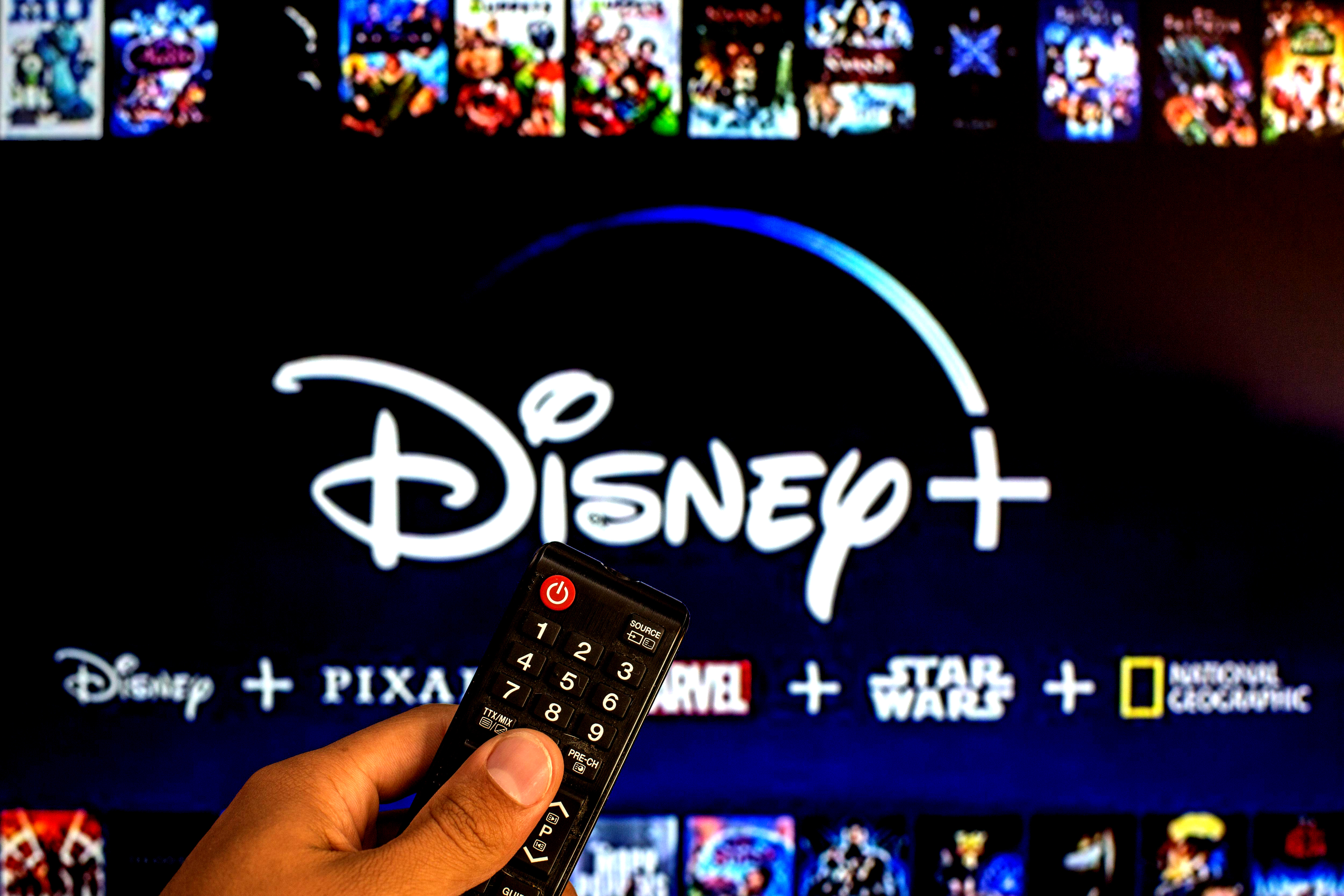 Save 72% On Disney Plus And Stream 'Moana 2' For Less
Save 72% On Disney Plus And Stream 'Moana 2' For LessFeature This limited time deal allows you to get the Hulu and Disney Plus Bundle Basic for $2.99 per month for four months. It's also just in time to stream "Moana 2."
-
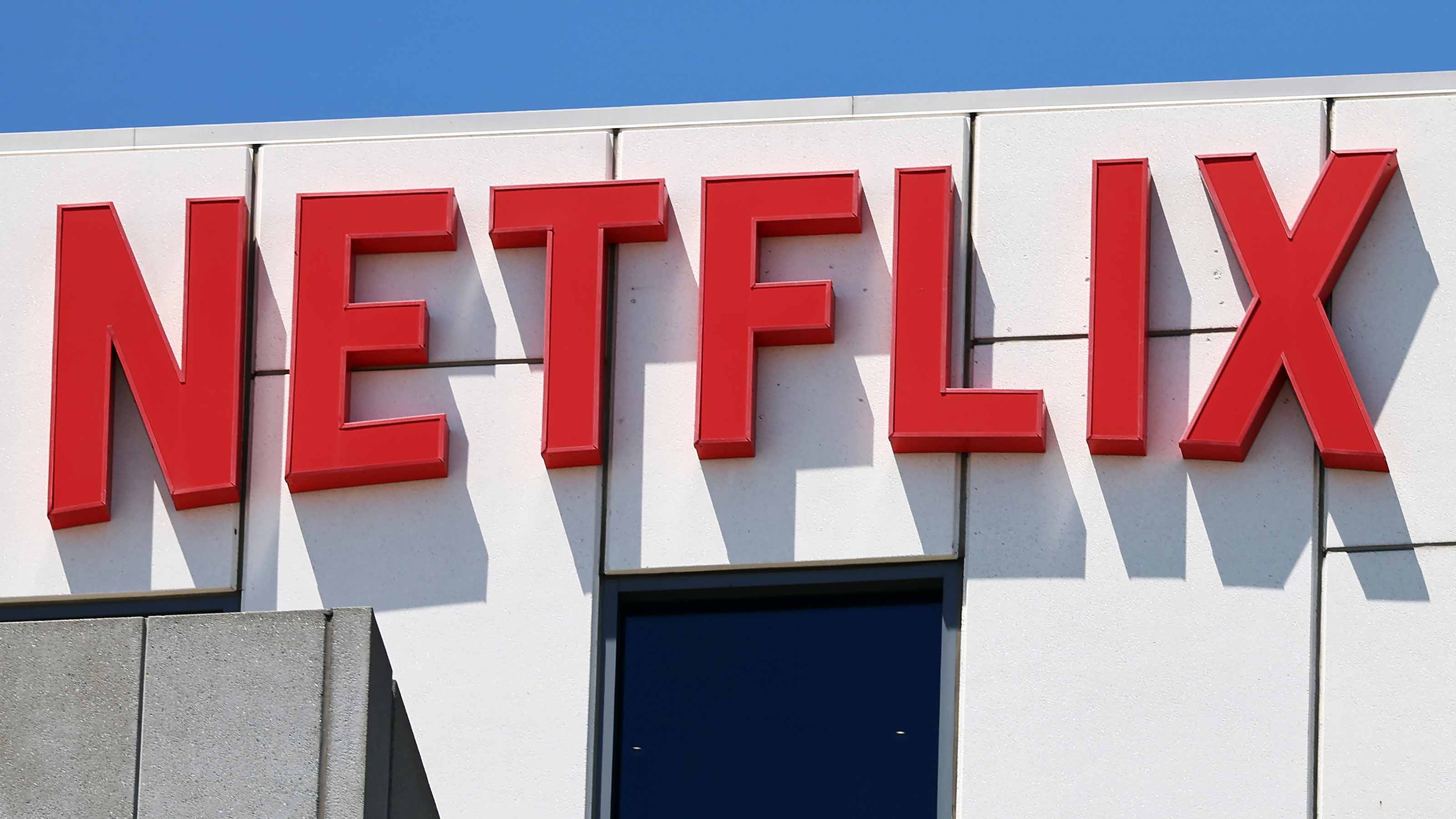 Netflix Hikes Prices Again As Subscriptions Climb
Netflix Hikes Prices Again As Subscriptions ClimbNetflix joins Discovery, Amazon, Disney and several other streamers that have recently boosted prices.
-
 Discovery Plus Hikes Prices. Will Netflix Follow?
Discovery Plus Hikes Prices. Will Netflix Follow?Discovery Plus joins Amazon Prime Video, Disney Plus and others in price hikes. Rumor has it that Netflix is lining up to be next.
-
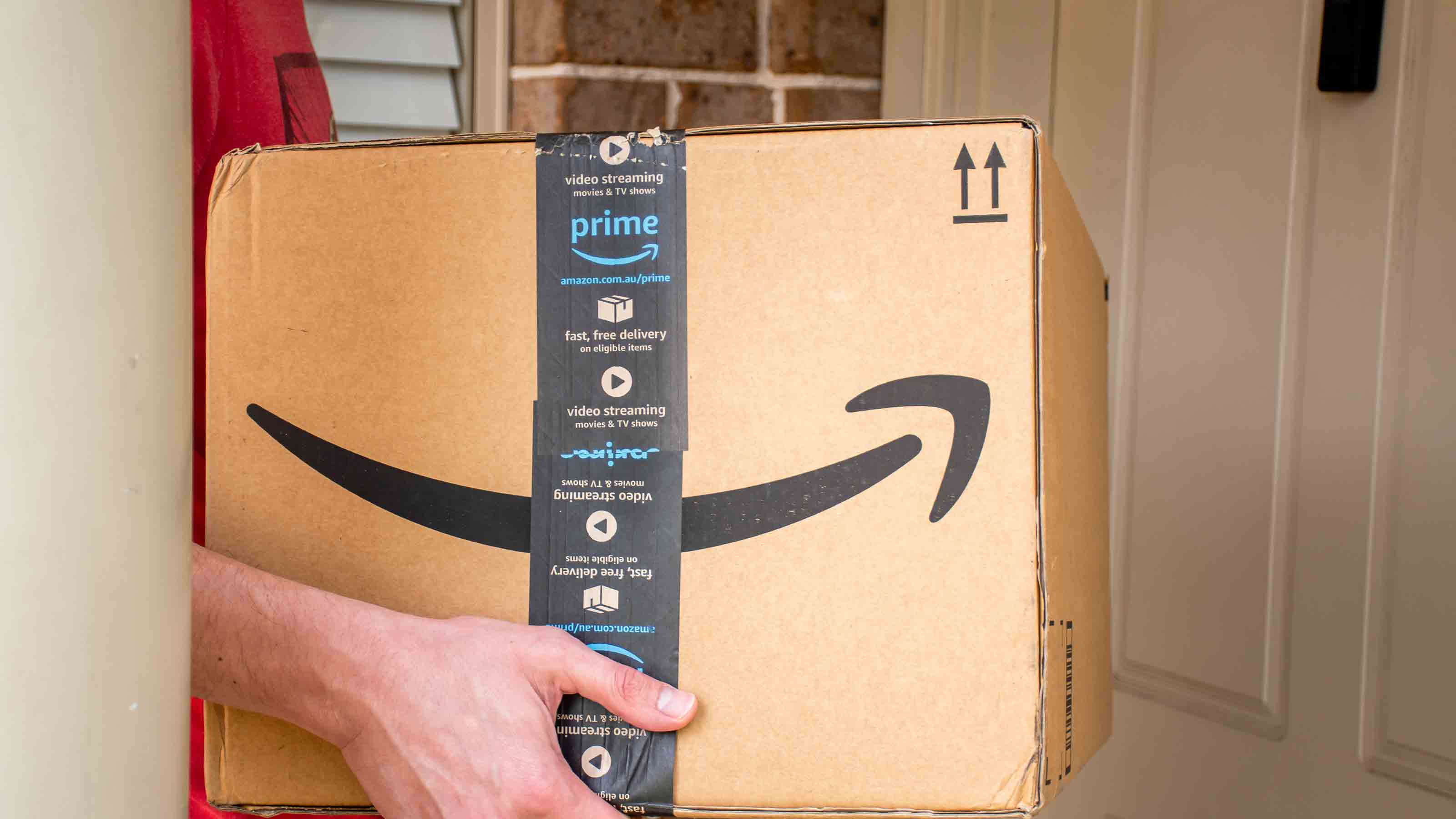 Should You Cancel Amazon Prime? Here Are 12 Good Reasons
Should You Cancel Amazon Prime? Here Are 12 Good ReasonsFeature Here's why it might be time to cancel your Amazon Prime subscription.
-
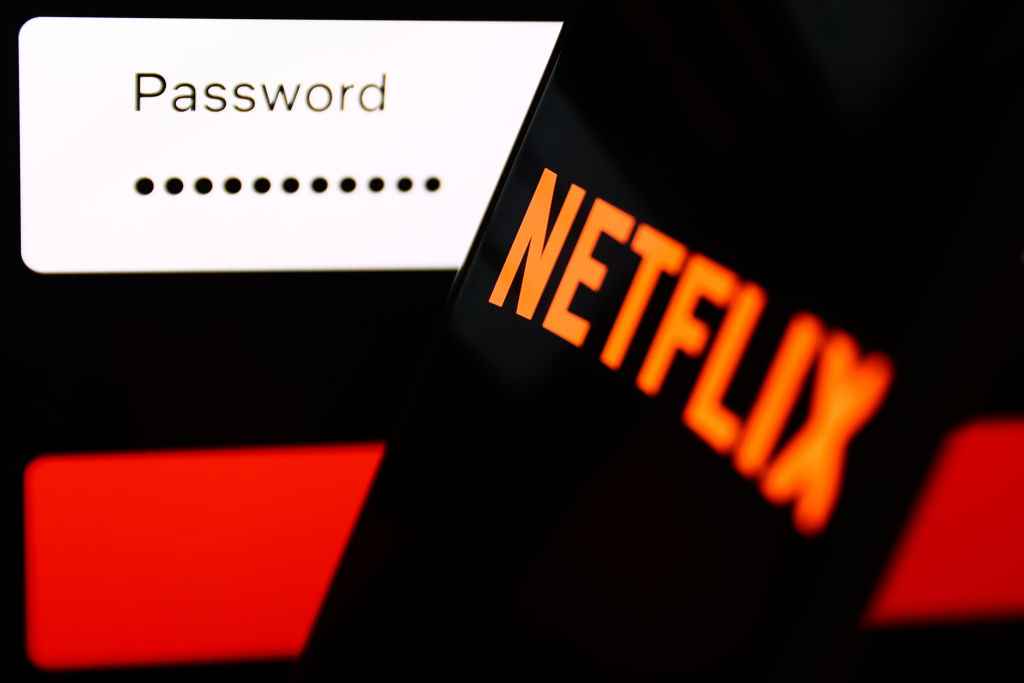 Netflix Password Sharing Crackdown Will Affect 100 Million Users. Here’s Everything We Know.
Netflix Password Sharing Crackdown Will Affect 100 Million Users. Here’s Everything We Know.Netflix password sharing won't go away, but you'll have to pay for the privilege if you're not in the same household.
-
 Disney Plus' Streaming Service With Ads is Still a Good Deal
Disney Plus' Streaming Service With Ads is Still a Good DealWhile Disney has raised the prices of its ad-free streaming services, Disney Plus with ads remains a cheaper option.
-
 Netflix Comes to Walmart for a 1980s Throwback
Netflix Comes to Walmart for a 1980s ThrowbackNetflix and Walmart are building on Boomer and Gen X nostalgia for Blockbuster with in-store shopping options for a trip back in time.
-
 Are You Streaming Too Much? What the Discovery+/HBO Max Mashup Means
Are You Streaming Too Much? What the Discovery+/HBO Max Mashup MeansSmart Buying Fewer original scripted series? Maybe. And maybe it’s time to unsubscribe.